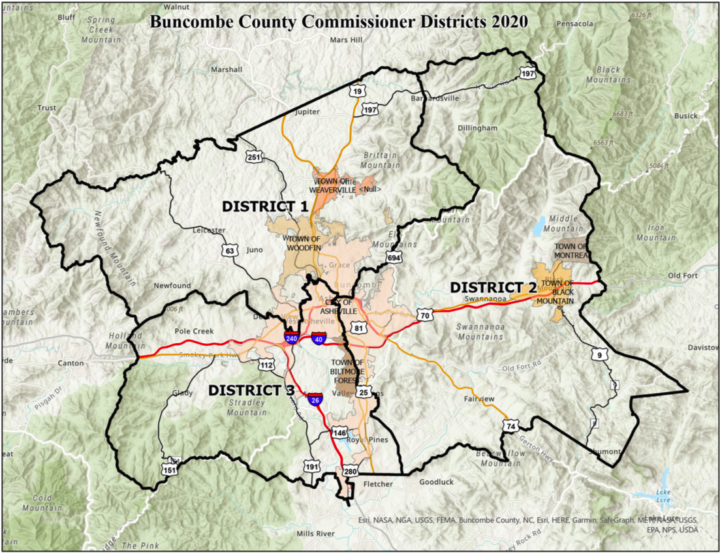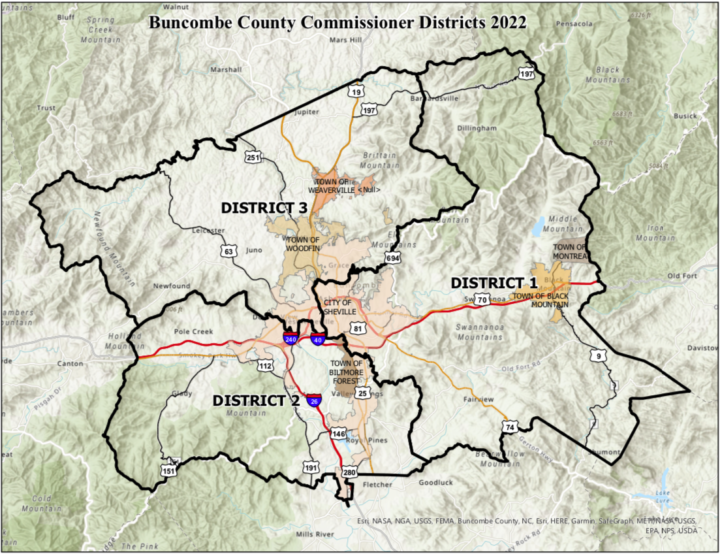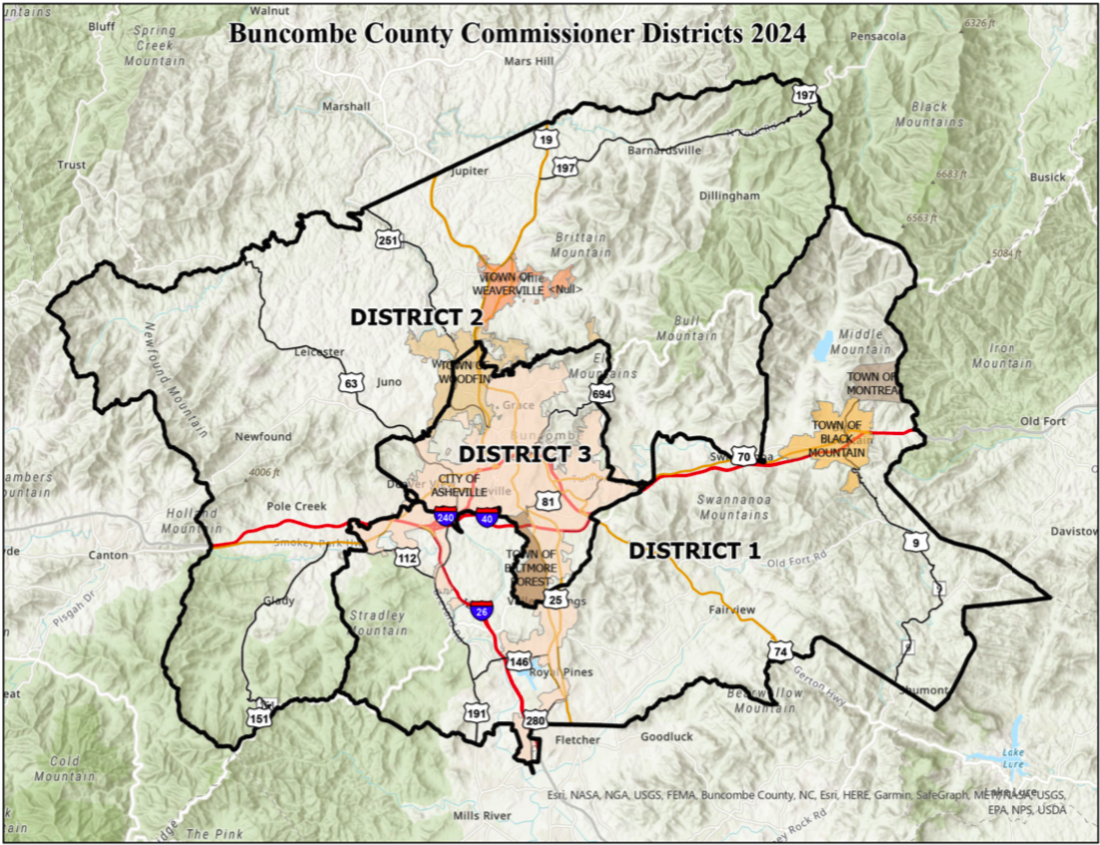To keep up with changing maps, elections officials are wearing out their Sharpies and ibuprofen supply trying to figure out what new district county commissioners represent every two years, and who’s eligible to run in 2024.
The state will operate on its third set of maps in four years for the U.S. House, N.C. Senate and N.C. House districts after the N.C. General Assembly passed redrawn lines Oct. 25.
For Buncombe County, unlike any other county in the state, that also means new county commission districts. Since 2011, Buncombe’s commission lines have been uniquely tied to the state House lines because of a bill sponsored by state Rep. Tim Moffitt, who represented Buncombe at the time. The Republican now represents Henderson County.
“The goal in Buncombe is simply to carve out one Republican seat, and the same logic would apply to the County Commission,” says Chris Cooper, professor of political science and public affairs at Western Carolina University. “So it’s a good thing for the Republican Party.”
That bill also expanded the Buncombe County Board of Commissioners from five to seven seats, requiring all but the chair to be elected by districts. The chair is elected countywide.
“Putting it in districts helps the Republicans and then putting it in districts drawn by Republicans helps Republicans more,” Cooper notes.
Moffitt did not respond to multiple requests to comment for this story. Buncombe’s lone Republican representative at the state level, state Sen. Warren Daniel, says he thinks tying the County Commission to state House lines makes sense.
“I didn’t represent Buncombe County at the time that process was passed into law, but I do think it could be a model for other urban counties whose house districts are all contained within a single county boundary,” says Daniel, who lives in McDowell County and will now represent outlying rural areas of Buncombe.
Kathie Kline, president of the Buncombe Democratic Party, vehemently disagrees.
“This is just an example of NCGA Republicans’ petty efforts to confuse and subvert our voters because Buncombe consistently favors Democrats, but our voters see this for what it is and will not be deterred in expressing their overwhelming support for Democratic values in our community,” she says.
How we got here
After the contentious 2020 presidential election, the Republican-controlled General Assembly redrew maps that experts said gave Republicans a better chance to win more state races, but the N.C. Supreme Court struck them down, saying they were too skewed. The court implemented its own maps to be used in 2022 until more permanent maps could be drawn. After Republicans regained a majority on the court, the ruling was reversed, opening the door for Republicans to draw yet another set of maps for 2024.

Beyond partisanship, all of these changes mean county commissioners up for reelection have a different set of constituents and voters who might not see their previous commissioner on their ballot, even if that officeholder is running again as an incumbent. County election officials have to sort through all those changes, which takes time, and because this is the second straight even-year election with new maps, staff has to balance three maps when determining who represents whom in the county.
The fact that county commissioners run on staggered terms, with at least three commissioners running every two years, not including the chair, makes representation even more confusing.
And there’s a financial burden on taxpayers as well, says Buncombe’s Director of Elections Corinne Duncan.

It costs about $56,000 to send new voter registration cards to all 206,000 voters in the county with their new and correct voting districts printed on them, because of the changes, Duncan says. New cards are slated to go out in January.
Who represents whom
In a recent meeting with county elections officials, Duncan and Victoria Pickens, accounting and campaign finance specialist for the elections office, laid out color-coded maps with writing in the margins to try and help explain who represents which district now and potentially in 2024.
Basically, we are working with three maps at once, Duncan says.
Commissioners up for reelection in 2024 — Terri Wells, Jasmine Beach-Ferrara and Parker Sloan — currently represent Districts 1, 2 and 3, respectively, which they were elected to represent back in 2020.
Because of the changing lines, Sloan and Beach-Ferrara would have to run against each other in 2024 in the new District 3. However, Beach-Ferrara announced in October that she wasn’t running for reelection so she could spend more time with her family. When pressed in November, she confirmed that the changing districts had no bearing on her decision not to run.
Both Wells, who will run in District 2, and Sloan, in District 3, have announced reelection campaigns. There will be no incumbent running in the new District 1, which now includes the east Buncombe, Fairview and South Asheville areas. Matt Kern, who lives in Riceville, has announced a bid for that seat.
Meanwhile, Al Whitesides, Martin Moore and Amanda Edwards — who were elected in 2022 based on a different set of maps — continue to represent Districts 1, 2 and 3, respectively, as they were drawn for 2022.
Edwards has announced a campaign to run for chair to replace Brownie Newman in 2024, a seat that is elected countywide. Newman has announced that he is not running again.
If Edwards is elected chair, by rule, because she is a registered Democrat, the Buncombe County Democratic Executive Committee would appoint her replacement from the district she was elected to represent, or the 2022 version of District 3. That district encompasses north and northwest Buncombe. When that term is up in 2026, her replacement would have to run in the district in which they live, based on current maps. If these maps hold, that would likely be the new District 2, which spans the far southwest, northwest and northeast corners of the county, as well as parts of Swannanoa.
Edwards says the frequent changes have created confusion among voters trying to figure out who their commissioner is, but at the end of the day, commissioners will take calls from anyone in the county.
“If someone reaches out to me unsure of who their commissioner is, I’m going to listen to their concerns, and then help get them directed to the right place, and often to the correct commissioner who can help them navigate their challenges,” she says.
Wells says she is happy to help anyone who contacts her, no matter where in the county the person lives.

Regardless, Cooper says, it’s hard even for experts like himself to follow what all the changes mean year to year, and that is bad for everyone.
“I think it’s incredibly confusing for candidates. It’s incredibly confusing for voters. It’s a bad way to run a democracy,” he says.
Cooper says despite challenges from voter rights groups, the maps are unlikely to change again unless the makeup of the Republican-majority N.C. Supreme Court changes, which probably won’t happen until at least 2030.
State Rep. Lindsay Prather, a Democrat who represents Buncombe, says regardless of what party is in power, maps should be drawn by independent, third-party consultants, not partisan legislatures.
A more competitive district
The biggest potential partisan impact of the new maps is in representation for the new District 2, currently represented by Wells on commission and Prather in the state House.
All state-level representatives are up for election this year.
Buncombe’s state House districts went from three Democratic districts to two Democratic districts and one district that leans Republican, Cooper says.
House 115, in which Prather lives, is the one people should be “laser-focused” on, he says.
“It went from a lean Democrat district to a lean Republican district. So all else being equal, we would expect a Republican to come out of that district,” Cooper says. However, because Prather is an incumbent, she will have some advantages, but Cooper expects it to be a close race.
“I’m not saying a Republican will win. I’m just saying it’s now possible for a Republican to win,” he adds.
Prather retains her confidence, however, despite what could be perceived as an attack on her seat.
“I am certainly a type of candidate that the Republicans do not like to see in the house,” she acknowledges.
She argues that geographically, the district actually isn’t that different from the way it was in 2020, when she won the seat in the first place. Like then, her district includes north and northwest Buncombe; it has just now expanded to include the northeast and southwest corners of the county as well.
That being said, Prather says it’s clear the Republicans did everything they could to draw a district for themselves to win.
“They essentially tried to pack every even slightly red-leaning or red precinct into the same district,” she says. “I’m really looking forward [to the campaign.] I really think the things I’ve been fighting for are things that apply to this district just as much as they did my previous one.”
For Wells, the changing district just represents an opportunity to meet more people.
“I love serving the people of Buncombe County,” she says. “And so no matter which areas they decide are the areas that I am to campaign in and serve, I love doing it. And I love getting out and meeting the people and getting an understanding of what the issues are and what their concerns are. And I’ll work hard for everybody.”
Voters can find out what districts they reside in by entering their addresses at avl.mx/d7v.




Until Republicans stop running right wing ideologues and trumpnuts, reasonable neighbors with servant leadership like Terri Wells, Lindsey Prather, and Matt Kern will be fine.